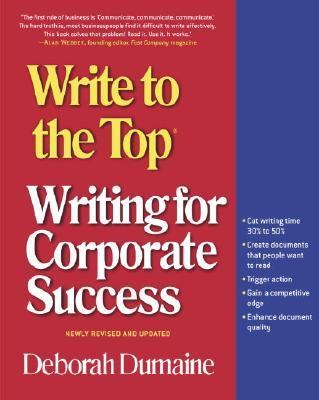2105438
9780812968989
Write to the Top Writing for Corporate Success
by Dumaine, Deborah
About this item
- Condition: New
- Provider: Mediaoutdeal1234 Contact
- Provider Rating: 64%
- Ships From: Springfield, VA
- Shipping: Standard

About this item
- Condition: Like New
- Provider: BookCellar Contact
- Provider Rating: 92%
- Ships From: Nashua, NH
- Shipping: Standard, Expedited
- Comments: Almost new book. A portion of your purchase of this book will be donated to non-profit organizations.Over 1,000,000 satisfied customers since 1997! Choose expedited shipping (if available) for much faster delivery. Delivery confirmation on all US orders.

Product details
- ISBN-13: 9780812968989
- ISBN: 0812968980
- Edition: 3
- Publication Date: 2004
- Publisher: Random House Publishing Group
AUTHOR
SUMMARY
Writing Can Make or Break Your Career Most of us dread writing in some way Tom LeBlanc glances at his watch and then back at the empty screen in front of him. The ticking of the wall clock grows louder, and a siren outside the window makes him lose his train of thought for the second time. The right words are just beyond his reach. His mind wanders to the next day's appointments and to the movie he is going to see with Elaine that evening. A ringing telephone brings his attention back to the memo he wants to write. "I'm just not getting anywhere," he thinks. "I know pretty much what I want to say, but I can't get those first words out." Tom stands, straightens up his desk, and wonders if a cup of coffee will wake him up. "Maybe I'll just let it go until tomorrow," he mutters. An enormous percentage of the people we work with tell us that they regularly feel the way this manager does. Whether writing a long report or a short memo, they find themselves staring at the blank page or screen more often than they'd care to admit. At those times the process can seem so overwhelming that many will do anything to avoid getting started. Writers get into this trouble because most of them were not taught an effective, step-by-step approach to writing. They were often told, with bright red pen, what they were doing wrong, but few teachers ever said, "Write this way!" Convenient distractions In the office there are many distractions: the phone rings, an associate drops by, or there's e-mail to check. Here is a list of obstacles to writing mentioned by participants in a Better Communications(r) business-writing workshop: -I need to clean my desk before I can start writing. -I can't find the time to do my job and write this proposal, too. -My manager called a special meeting. -No matter what I write, it will be ripped to shreds. -I don't understand why they want me to put this in writing. -I need to check my messages first. For those who dread beginning or who are embarrassed about their skills, almost any other activity will win out over writing. Our mass-media society sabotages good writing skills These days it's easy to communicate with a minimum of writing. The Internet gives us business information, news, and entertainment. Family, friends, and business associates are a phone call away. E-mail barely counts as writing anymore-much to the detriment of clear communication. People read dramatically fewer books than they did 50 years ago, and it shows. As we read less fiction or nonfiction, we are becoming far less comfortable with the written word. No wonder many people say that writing is the part of their job they like the least. In fact, most of them would probably be happy to see other methods of communication replace writing completely. Today's biggest writing challenges Our clients tell us that they are faced with several challenges that they are aware of. After listing these, we'll add a couple they may not be aware of. No time The first and most daunting task most businesspeople climbing the corporate ladder experience is the need to write twice as quickly as perhaps five years ago. In a company that has experienced downsizing, these people must be able to do a job that two or three did in the past. If they are slowed down by their writing responsibilities, their daily success and possibly their careers will suffer. The good news: This book has a solution that works for improving writing efficiency. At Better Communications we measure the writing productivity of over 4,000 graduates each year-and all report writing 30 to 50 percent faster after taking one of our workshops! Writer's block The inability to get started can have many causes: not knowing who your readers are or how to aDumaine, Deborah is the author of 'Write to the Top Writing for Corporate Success', published 2004 under ISBN 9780812968989 and ISBN 0812968980.
[read more]


